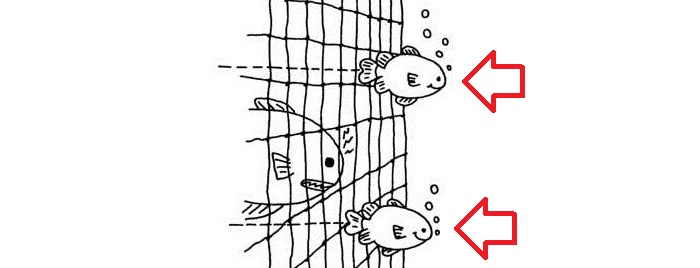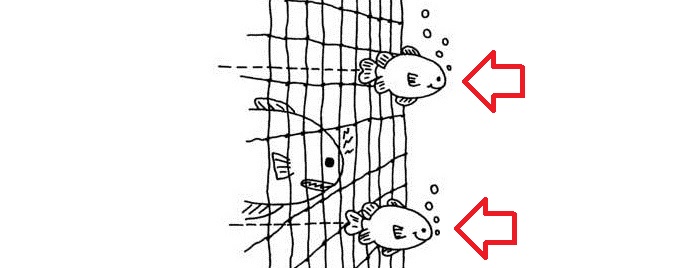Probably you are used to the presence of the banks in the society. And you are used to bring the money you earn to a bank. To withdraw the banknotes from the cash machines of the bank. To ask them for a loan, if you have to buy a house.
In short, you see it since forever… you use it since forever… but did you ever ask yourself exactly what is a bank? And what is its utility? Today I try to explain it to you, casting a new light on its nature and making you understand why, actually, the bank represents mostly a problem for the modern society.
 For some aspects, nothing special
For some aspects, nothing special
For some aspects, a bank is a commercial activity similar to all the others, in fact it’s a company that works with the purpose of making money.
From this point of view, it is perfectly identical to the butcher, the barber, the bar in the neighborhood. In the morning the employees of the bank wake up, executive, cashier, financial advisor, and they go to the office to give their labor contribution to make the bank earn more money, in change of a salary.
For one aspect, slightly special
But a bank often doesn’t have only one office, it has many offices, in different cities and often also in different nations. In fact it’s a corporation, a huge company, tentacular. And this is already a first remarkable difference with the little shop of the butcher.
But so far there’s not even anything too strange: there are a lot of corporations in the modern globalized world. For example, in addition to the banking corporations there are other types: food corporations (eg. mcdonalds, ferrero), fashion corporations (eg. versace, dolce e gabbana), consultancy corporations (eg. accenture, ibm), technology corporations (eg. apple, samsung).
For one aspect, SUPER SPECIAL
But there is one characteristic that makes the bank unique, absolutely unique.
All the other activities, from the little shop to the big non-banking corporations, earn money because they provide goods or services in return. The butcher provides meat. The barber provides the haircut service. The fashion corporation provides clothes. The supermarket provides food. The bar provides coffee. And so on.
What does the bank provide? The answer is: a gigantic nothing. The banking activity is the only one in which money is earned without providing any good or service in return. All the bank does is moving money. So the bank earns money… to move money! If you think about it it’s a very weird characteristic, that surely no other company in the world has.
It’s weird, in fact, that while all the other commercial activities revolve around “something” (meat, shoes, clothes…) with the desire of earning money, the banking activity revolves exactly around money, with the desire of earning money. It is very close to this object, for the very own nature of its activity.
This proximity gave birth to some really interesting situations.
They earn money with your money
A first interesting situation is the fact that the banking corporations have become so powerful, with time, that they influenced the approval of laws that give them huge advantages. These laws would probably be considered “scandalous” if made for any other commercial activity… that is not the banking one.
A notable example is the fractional reserve, i.e. the bank has the duty of maintaining in its office only a small fraction of the money you deposit, they can use all the rest the way they like: making loans to other people (earning money on it) and do speculations of all types.
The bank puts in circulation money that is not theirs to earn money, and this is the reason why, if you go to the bank and ask to withdraw 10.000 of your dollars from your account, two things happen.
First: you have to reserve them. The reason is simply that they don’t have that money in the office. Second: they’ll make up a lot of stories when they receive a request of this type. The reason is that, for them, that amount is worth much more than it is worth for you: by making loans with that money n times, since often after each loan the money comes back in the bank deposited by someone else, they can “magically” multiply the amount.
Paper money
Another interestinf fact is that the central object of the banking business, i.e. the money itself, it’s been transformed with time. For the worse.
Some time ago, the bank had some duties regarding money, meaning that they could only put in circulation banknotes if they had a corrispondence in gold in their safes. Let’s say that they could issue a banknote of 100 only if they really had 100 pieces of gold in their safes.
Now, this duty has been eliminated: money has become fiat, meaning that it doesn’t have any bond with gold anymore. The bank issues big quantities of banknotes, without having in their safes gold that actually covers those banknotes. This means that the banknotes are really just some pieces of paper, and their values is based now just on the reputation. A reputation that exists only until there is the ignorance, in the masses, of what money really is.
I want to clarify why it is important, in a negative way, that the banks got rid of the duty to own gold that corresponds to the banknotes they issue.
Gold is very different from the paper banknotes. Gold has intrinsic value, meaning that it has physical characteristics that make it perfect for medical, technological, industrial applications. Real life applications, that can improve people’s life. Instead, with paper you can’t do much more than lighting up a fire.
But gold is limited in the world: there is a certain amount and not more, and extracting it is also complicated. Paper instead is very easy to produce. So the move with which the banks got rid of the obligation to issue banknotes only if covered by the gold that they own, gave them the opportunity to create wealth for themselves… based on nothing.
More powerful than governments
A second situation is that with time the banks have become even more powerful than the governments of the nations. This is valid also for other types of corporations today, but the banks are definitely first in line.
The situation evolved in a way that today many heads of the governments, when they have to take decisions, almost always have to consult the bankers. Even more: often they have to ask permission to the bankers… and sometimes they even have to obey to the bankers.
When you hear in the news that the debt grows constantly (did you ever hear that the debt is diminishing?), the creditor of that debt are the banks. The reason is that these pieces of paper that we use to pay stuff, they print it and they lend it to the government, and the government commits to return it in the future with the interests.
But… how will the government pay the interests, if money is printed by the banks only, and it only has the money it borrowed previously? Simple: it will ask to more money to borrow, making other debt, always more debt. Debt that can’t ever be repaid.
This is the reason why it’s said, maybe you heard this already, that “money is debt”. They’re the same thing. Take a banknote in your hand and look at it. That banknote has been lent by the banks to your government, with the agreement that your government, one day, will give back as much as it’s written on the banknote… more the interests.
The bank doesn’t produce anything
I want to repeat and remark the central message of this article: the bank doesn’t produce any useful value for the society. At best, it can be defined as a freeloader that makes money thanks to the job of other people, a parasite. What people really need is food, clothes, medicine, technology, culture, art, and not a circus that make useless paper spin around.
The most humble workers, like the shoe repairer, or the farmer who grows potatoes, they produce an immense value for the society compared to that of the bank, whose concrete action is just to move money around.
Do you work in a bank?
Every morning millions of people in the world wake up, jump in the car and go to work for a bank. Lines at the bank offices, computers munching data, executives doing meeting, it would be nice to have an animation that could show daily how much motion is produced by the banking system in the globe. To realize, indeed, how much energy is sucked by this industry that produces the galactic nothing, apart from moving money. It would be comic and tragic at the same time.
Now, and if you’re inside this industry? And if you’re an employee who works at a branch? What if you’re an accountant? Or you’re the head of a branch? Or you’re a super-head of the european central bank? Or you even come from a family of bankers?
In this case I would say that there are two possibilities.
The first is that you’re in that place because you are unaware of the real nature of the company you’re working for every day (or at least you were before reading this). This unawareness is very frequent at the “lowest” levels of the chain, but I am sure that also many executives work for a bank without being fully aware of what is the real meaning of the company they work for.
I’ve been part of this group. I found myself working for a bank in the past. Actually as an external consultant, for few years, and in the technologic sector, but I’ve been definitely a small active part of this industry.
Those were the years when I understood what “bank” means, and that comprehension has been for me one of the strongest motivations to leave that job. I like to think that I can give, with my job, a contribution to make the world a better place, to help others, to produce something that can have a true impact of the life of people.
The idea of using my time -and my labor talent- in a circus that makes useless paper spin around is really depressing for me. I like what the professor of dead poet society says: life is a big poem, in which each of us has the chance of adding a verse. I surely don’t want that my verse is to have spent 40 years manipulating useless pieces of paper. Today I can imagine a million other ways to give more value to the society than I would do working in a bank. An example is providing education, writing articles like this.
The second possibility is that you live in denial. You know how the banking system really works, but you silence every voice that tells you that you’re contributing, with your work, to a futile cause.
The resources that your bank uses could be used to create concrete wellbeing, to make people happy, rather than load them with debt? You prefer not to think about it. You put your tie on and go to work without asking yourself too many questions. Similarly to those paople who eat meat produced industrially, when you ask them “but do you know how that is produced?” they reply “oh I don’t want to know, otherwise I will end up eating nothing”. Blue pill.
What is the adtantage of knowing this?
I want to clarify one thing: the people who understand how the banking system works and what is the utility of the banks (a big nothing) are a minority today, and will be minority still for quite a while. The majority of people are still unable to understand this mechanism, or they’re not interested in understanding it.
If you, instead, are among those who have reached this comprehension, and I hope I have given a little contribution, then in what position are you?
Well, you continue to play in a world where the bank is part of the rules. It’s unlikely that you will be able to do anything without entering in contact with the bank. The job salary is sent directly to the bank. You have to make bank cheques to buy a house. Everybody keeps on considering paper banknotes valuable objects, so they will ask you for them in return for any good or service.
But you can do several things. First, if like me you think that the meaning of life is to give to the world your unique and wonderful talents, you will stop employing these talents in a bank, if you work there.
Some time ago I watched an interview to some personality, I don’t remember who it was, who was asked “what would you do if you’d be elected president of the Federal Reserve?” and replied “I would shut it down”. I thought it was a great answer, because it’s exactly what I would do if I’d be put in command of such a mega-banking association.
Other thing, you can stop subsidizing this useless circus with your savings. Aware that the entire world sits on a giant paper ball that could burn in any moment, you can turn your savings into commodities (like gold and silver) that preserve their value with time, rather than keep on focusing on modern money that loses value gradually, every day, because its value depends on the decisions of the government and the banks.
Understanding how volatile the value of money is will free you from an enormous distraction. It will make you assign more value to other things, for example your time. It will help you understand that the indoctrination that you received since you were a kid, telling you that money is so important, is just an indoctrination. As soon as you reassign the proper importance to your time, you can use it in activities that make life more enjoyable and adventurous. And this looks like a big advantage to me.
Useful readings
To better understand the banking system I recomment two great books: the real story of money, health and religion by Loren Howe and you can profit from a monetary crisis by Harry Browne, that contains very intelligent advice on how to manage your savings. In the first book, instead, there’s a famous quotation that I write here too:
It is well enough that people of the nation do not understand our banking and monetary system, for if they did, I believe there would be a revolution before tomorrow morning. -Henry Ford-
It says a lot. A lot!
Notes: Translated from the corresponding article written in Italian, published in this blog on September 12, 2014.
Related: What is the “system”?, Inside an intensive pig farm




